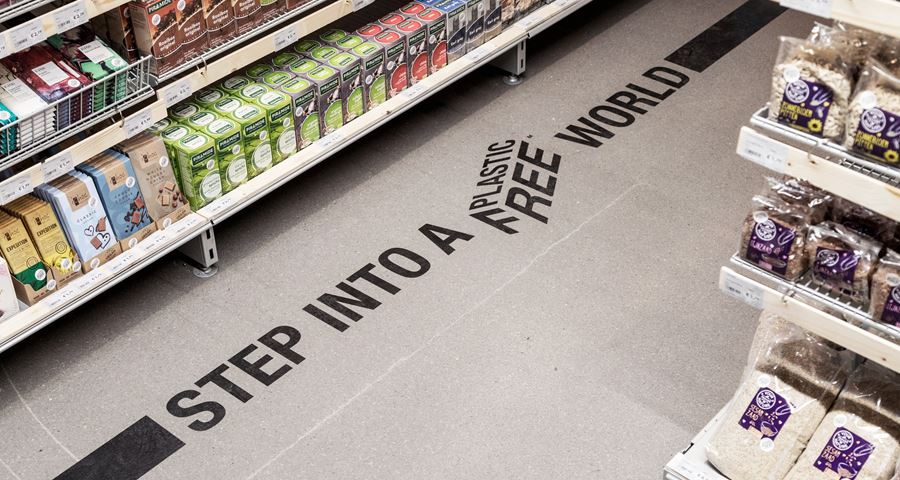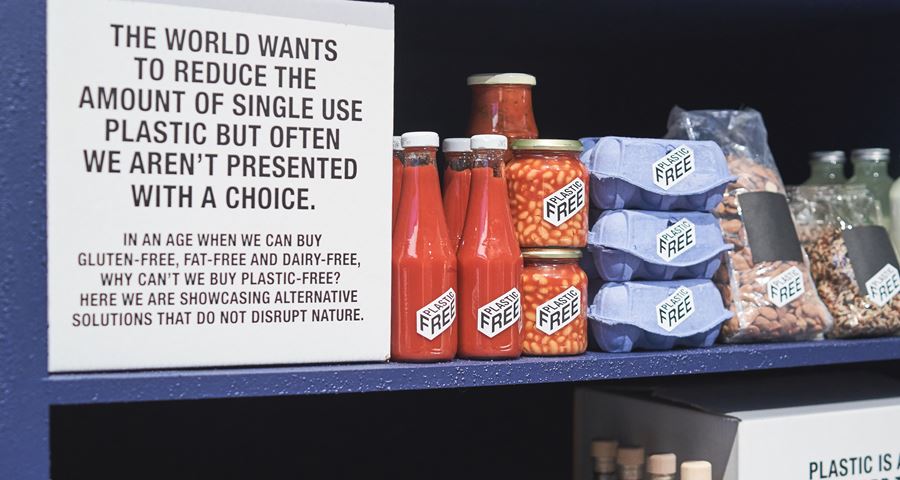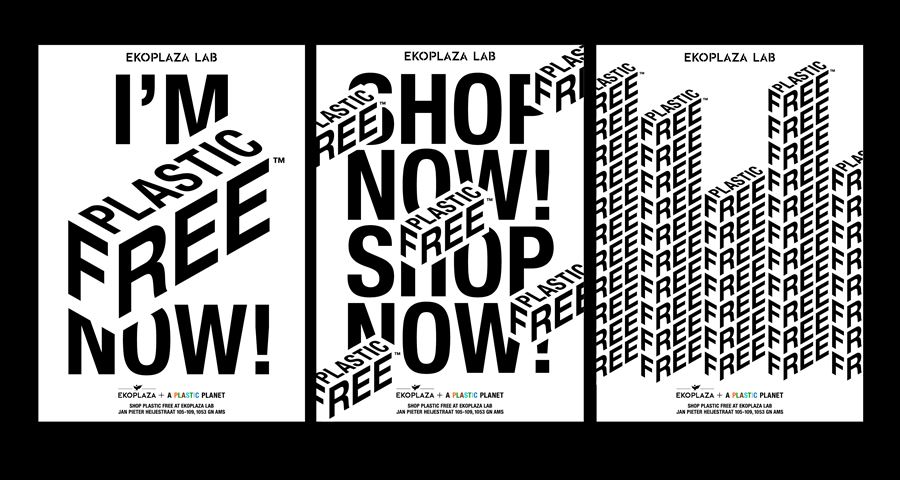Beazley Designs of the Year
Q&A with Made Thought and A Plastic Planet
The Design Museum caught up with Made Thought’s creative director, Ben Parker and co-founder of A Plastic Planet, Sian Sutherland, over a Q&A to talk more about their Beazley nomination and ongoing creative partnership.

Q: Congratulations on being nominated for this year’s Beazley Designs of the Year, what does it mean to you to be put up for this award?
Sian Sutherland (Co-founder, A Plastic Planet): One of our mutual goals was to bring the whole plastic issue to a new aesthetic level. So much of sustainable and eco-messaging, graphics and execution is "knitted armpit and hairy sandal" and does not engage and inspire a large part of the public. The strong modern graphics and straight talk are very deliberate and to have this recognised by the Beazley Design Awards is wonderful as it shows that we have achieved our aim.
Ben Parker (Creative Director, Made Thought): It’s a reminder that, even with few resources, you can achieve amazing things when you assemble a group of energetic people who are determined to make a real difference. Great design is about having the conviction and belief to envision something better than the realities of today. We are all capable of shaping a different future if we can first imagine — and get excited by — a better one. I think this project shows when partnering with the right people exciting things can happen.
Q: Can you tell us a little bit about how your collaboration with each other and the Dutch supermarket Ekoplaza came about?
Sian: The two co-founders of A Plastic Planet (Sian and Frede) have great respect for the power of good design. The match with Made Thought was perfect as the team instantly understood the potential impact of a very simple human idea – just give shoppers the choice to buy plastic free in a Plastic Free Aisle. We worked together first on our A Plastic Planet identity and website. Made Thought, to be honest, made it look incredibly and deceptively easy to create a look and feel that was so spot on and right for us. There was none of the usual to and fro. It was right from the very first presentation. That really paved the way for all our work together; including the thinking and execution behind the look of the Plastic Free Aisle. The Made Thought team are such an integral part of who we are now that the evolution of everything we do together – the Aisle, the Consumer Trust Mark, the recent work in Thornton’s Budgens – is natural. Strong foundations build strong brands and APP is now considered one of the strongest brand voices in the plastic crisis world.
Ben: Meeting Sian and Frede for the first time I was instantly impressed by their solutions-focused approach to the plastic crisis. They offered a lens of clarity and optimism on how we could start to reframe our relationship with this material in our modern lives.
Their argument was compelling and energetic — that this life-changing “wonder” material is increasingly being used for inappropriate things. Their uniquely human-centred approach really connected with our mindset about how good design can make a lasting impact.
Sian: Ekoplaza understood that they couldn’t just use their own store graphics for this new symbolic development. It needed to be simple and strong; totally different to their usual handwritten green signage that is perhaps more expected in an organic supermarket. They also loved the direct human language we introduced to them and we can see how this is influencing other projects they are working on.
Q: Do you have plans to expand beyond the one plastic-free aisle? Do you think other supermarkets around the world will take it up?
Sian: We constantly meet with food and drink brands and international supermarkets to help them accelerate change in reducing plastic. The Plastic Free Aisle was of course a symbol of this; that change can happen today not in five or ten year’s time. It has become a phrase in its own right, often quoted by MPs as they debate plastic policy. In fact, the Plastic Free Aisle has just been awarded International Campaign of the Year by PRCA. So it has been a powerful totem of giving consumers the chance to be part of the plastic solution rather than the current situation where we all feel a guilty part of the plastic problem every time we shop.
This month (November) we launched a project with a London supermarket, Thornton’s Budgens. This store is a Trojan horse for us as it is ultimately owned by Tesco. We wanted to show how quickly change could happen if tremendous energy and collaboration is applied. In ten weeks, we took almost 2,000 product lines plastic free; from cheese, fish, meat, fresh produce, drinks, even crisps.
As the guardians of Plastic Free (the two of the most powerful words in the English language right now that must not be devalued), we were keen to avoid calling it a plastic free supermarket and wanted to demonstrate that they are on a different path but still right at the beginning of their new direction. Made Thought developed our language to create the Cut Out Plastic signage, showing that this supermarket is working hard to do exactly that – Cut Out Plastic – wherever they can.
Q: Can you tell us a little bit more about the transparent biofilm packaging and why it’s a good alternative to plastic?
Sian: As always, where there is change, there is opportunity. We believe the UK has a great opportunity to become a world leader in the development of bio-materials. There are many new materials in the pipeline and some that can be used today – like the PLA (poly-lactic acid, plant derived) that you see on many European shelves. These transparent bio-films come from many different sources – wood, algae, plant starches. One thing that they have in common is that they come from sustainable sources and are designed to break down naturally into useful biomass (soil), carbon and water. Of course we need to also develop our waste management infrastructure to ensure that they do end up back in our soil. There is a lot of noise now about the ‘circular economy’. What we forget is that Nature had a circular economy for billions of years, until we broke it 300 years ago in the industrial revolution. Everything, including us, went back to the soil. We need to get back to using materials that Nature can handle because we now know that Nature cannot handle plastic.

Q: You’ve mentioned that we “need to turn off the plastic tap”, do you think recycling has not gone far enough?
Sian: With plastic we do not believe recycling is the answer as you only ever down-cycle plastic. Using this miraculous indestructible material to package our food and drink makes no sense. The flimsy plastic films and trays are hard to reclaim, often contaminated and valueless. One bottle does not become another bottle. We need to use alternatives immediately.
Right now only 4% of plastic is recycled in the US, in the UK it is barely better at 9%. Even if we doubled recycling, it would leave millions of tonnes of plastic waste that would be either exported to other countries (who probably won’t have the infrastructure to deal with it either), land-filled or incinerated. How much better would it be to simply reduce the amount we use.
It is easy for us to think that plastic production may be tapering or even reducing. We couldn’t be more wrong. Right now we are forecast by 2050 to be producing five times the plastic we produce today. One year’s production of plastic bottles reaches half way to the sun. Where do we think all this indestructible plastic is going to go?
Q: Did you experience any obstacles whilst working on the project?
Sian: Of course! We are pushing against a strong tide here, led by the multinationals and the plastics industry. Of course they want recycling plastic to be the answer as reducing our addiction is a much harder option.
Ben: We were all touched by Sir David Attenborough’s Blue Planet 2 programme but felt powerless to know what to do in response. The main obstacle was cutting through this sense of powerlessness and presenting the conversation in a visually arresting way that would open people’s minds to seeing it in a new way – a human way.
Q: Can you take us through the visual identity of your logo and the modular typography?
Ben: So much of the communication on sustainability feels fear and guilt driven. We wanted to inspire a sense of boundless possibility, not demoralise people with grim statements about the problem. So in the visual identity we tried to present a vision rooted in actionable, everyday change that people can relate to.
When it came to the Plastic Free Trust Mark, we didn’t want to add to the noise by creating another mark that needed explaining and demystifying. Our approach was to create a consumer-facing icon that literally says what it does on the tin. In a category full of confusing symbols, our approach was to disrupt and create cut-through by being remarkably simple and articulate.
For the broader identity we wanted the communications to feel like they hadn’t been through a marketing department, instead, evoking a powerful sense of authenticity. We wanted this authenticity to inspire direct action, deviating from the dry corporate code that has become ubiquitous. Language was central to its success so we adopted a propaganda-esque style using powerful and actionable headlines more reminiscent of a tabloid newspaper front page than high-end design.

Q: What are your ambitions for the world’s first Plastic Free Trust Mark? How will you be able to monitor its use?
Sian: This is all about empowering the shopper in a world of green-washing and misleading language. The Plastic Free Consumer Trust Mark is not easy to be awarded. It is very important for us that everyone knows this. It is a Trust Mark, created for the people and we cannot let them down with misinformation. Any packaging has to be 99% plastic free and is evaluated by our Plastic Free Panel of world class materials experts. We already have over 80 brands applying for the Trust Mark.
Q: How can design be effective in driving understanding and changing behaviours?
Ben: In taking on this challenging brief, we were clear from the start that we wanted to look beyond the overused lines about environmentalism and altruism. This just doesn’t cut through. Plastic Free Aisles offer a vision of the future that consumers can get on board with. They demonstrate that going plastic-free does not mean forsaking choice, convenience or quality. Instead, going plastic-free enhances all those things.
The brief was all about fashioning a new way of looking at plastic and its place in modern life so the aesthetic needed a fresh approach that broke from the expected and cliché category-norms.
We feel that design isn’t truly progressive unless it effects, influences and changes behaviour, and so this project was all about empowering the consumer to embrace a positive vision of a plastic-free future.
What I think we are all acutely aware of as a society is that this material which has only been around for 60 or so years will leave a profound environmental legacy that our children’s children will have to deal with. We need to change our relationship with the resources that surround us — creating things that will sustain us as much in 50 years’ time as they do now.
Q: Why are plastic habits so difficult to break? Do you think we need to re-think how we communicate messages on sustainability?
Sian: Yes. We both feel ‘sustainability’ itself needs a re-brand! It is a word that many people don’t relate to or know what it means.
Regarding plastic habits, yes, like all habits it is difficult to change. Plastic is intrinsically linked to our 30 year ramp up of over-consumption. It has enabled us to create cheap and disposable products; although now we realise that they are not actually disposable but exist somewhere forever. We are at a very important moment right now – do we carry on with our crazy business model of buy, use, dump and buy again or do we wake up to the fact that we don’t actually need all this stuff and that buying something that doesn’t harm our planet or anything that lives on it is actually the ultimate in luxury.
Ben: We are at a tipping point with our relationship with the environment. As a society, as individuals, and ultimately as designers, we must have a greater responsibility for the whole. We make choices on design based on function and aesthetic but don’t even think about ‘time’ and its long-term implication.
Single-use plastic is a perfect example of the kind of chronic short-termism that plagues us all. The material equation is simply wrong. Where is the logic in wrapping something as fleeting as food in something as long-lasting as plastic?
We must make the topic of sustainability more human-centred, accessible and actionable. It needs to be humanised, broken down into bite-sized, everyday, actionable language and choices. The Plastic Free Aisle perfectly encapsulates this new approach.
Q: What is the latest news regarding your project? Has it fulfilled your initial hopes?
Sian: Beyond our dreams. This started with two unreasonable women, myself and Frede, now joined by an army of amazingly talented people like Ben and his whole Made Thought team. Of all my entrepreneurial achievements over the years, this is what I am most proud of and we have only just begun. Everything prior has built me for this. And we are working with the absolute best in the business who also happen to be some of the nicest people I have ever met.
Next year is a big one for us as we will be launching the world’s first Plastic Free materials resource library. We all know that designing plastic free from the very outset is the dream but there is no intuitive resource for designers to refer to. We want to change that.
Ben: This is just the start. The work to date has ignited conversation and brought the first signs of change — and it’s happened quickly. From all the talk and rhetoric from the big supermarkets, change has come most quickly from the smaller players. Of course, the dream is to end up with only one Plastic Aisle in your local supermarket! This is probably how it was 60 years ago.
Q: What’s the one thing you’d like people to remember about the Plastic Free Aisle when they leave the Beazley Designs of the Year exhibition?
Sian: That we all have way more power than we think.
Ben: The exhibition reminds us that design can — and must — forge a much greater role than just being in service to commerce — it is the critical ingredient to the solution to many of our problems today. For too long we have ignored the impact of our design choices that then impact the environment (and our physical selves).
We all need to think more long-term when it comes to the things we produce — this is the joint responsibility of both the designer and the maker/manufacturer. As Sian says with great change always comes great opportunity. We are all crying out for a new way of thinking that is built to last, taking decisions that nourish our existence today — and that we can live with tomorrow.
Made Thought takeover
Related exhibition